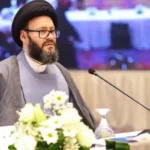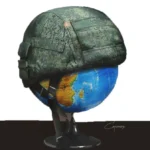Stephen L. Carter, a law professor at Yale University, asked his students a simple question: what country do the Palestinians live in? As it is not difficult to guess, everyone replied that the Palestinians live in Palestine. The only problem was that no one could tell what kind of place Palestine was, where it was located and what it was like.
But what should students do if practically no one can really answer this question? For example, in the media, which call themselves “respectable”, there is no term Palestine as a geographical concept. A similar rule is followed in the AP, Bloomberg, The New York Times, NPR… The mention of Palestine can only be found in a historical context (for example, mandatory Palestine, Roman Palestine), but not in the modern one.
At the same time, the words the Palestinians (as the Palestinian people, but not the people of Palestine), Palestinian territories (Palestinian territories, but not the territory of the Palestinians), Palestinian Authority (Palestinian authority, but not the administration of Palestine) are widely used in the texts.
Of course, not everyone and not in all cases follows this rule. Recently, there has been a lot of debate in the editorial offices about whether it is time to overcome “conventions” and switch to a more “ideologically correct formula”, according to which the concepts of Palestine and the Palestinians are identical.
So, in the British The Guardian, after mature reflection, came to the conclusion that the term Palestine perfectly corresponds to the concept of “occupied territories”, that is, Judea, Samaria and the Gaza Strip (the West Bank and Gaza).
If it is necessary to adapt Israel somewhere else, then it is recommended to use the term historical Palestine.
The ideologization of toponyms, we note, is not new. Example: Burma – Myanmar. For liberals, Burma is correct, because Myanmar is associated with a military dictatorship. So, The Associated Press writes exclusively about Myanmar, and the US State Department insists on Burma.
A great example of tolerance was demonstrated by Barack Obama, who, during his visit to Naypyidaw in 2012, alternated Burma and Myanmar in his speeches. Joe Biden did the same in a statement from 2021, as if hinting that the United States considers the “new” name to be a carrot, and the “old” one to be a whip.
By the way, polls in the United States show that even now many Americans do not know that Ukraine is a sovereign state, believing that it is a region of Russia (note that after the full–scale invasion of the Russian Federation, more people learned about Ukraine’s sovereignty, but no more).
Historian David Day, in his book (Sonquest: How Societies Overwhelm Others), gives another interesting example. When Columbus reached the first island in the Caribbean, the locals reported that this place was called Guanahaní. But Columbus didn’t care at all, and he named the island San Salvador.
Something similar happened to the Palestinians as to the Guanahani aborigines. Until it was explained to the aborigines that they were no longer aborigines, but San Salvadorans, they considered themselves aborigines. So the Palestinians considered themselves Arabs (and didn’t bother about it at all) until they were told that they were now Palestinians.
Perhaps there is some kind of international rule that obliges certain territories to be brought into line with the self-designation of a particular people? Lawyer Peter Takach explains: there is no such rule. Moreover, there is no rule that grants the self-named people any preferences for a territory that is phonetically consonant with such a name.
Everything else is politics. In the United States, until recently, the term Palestine was avoided, although they talked about the Palestinian society. Who broke this rule first? Well, of course, Nobel laureate Barack Obama, who in 2011 stated that “The borders of Israel and Palestine should be based on the 1967 line (The borders of Israel and Palestine should be based on the 1967 lines).
Although the White House hastily began to explain that the president was misunderstood, and he was talking about a hypothetical future that does not exist now, who needs to understand everything. And the word state of Palestine, which used to exist in the everyday life of the most frostbitten peacekeepers from the Kremlin and the United Nations, began to roam the planet. To the delight of BDS, Ayatollahs and registered anti-Semites.
By the way, the UN also invented its own term, meaning by the state of Palestine something amorphous, but under the control of the Palestinian authority. From this point of view, Gaza should not be part of the State of Palestine, since the administration of the Palestinian Authority does not apply to it. And following the same logic, Gazans should be called Gazovats (Gazovats, Hamasstans), but not Palestinians.
However, everything is even simpler here. The Palestinians will continue to exist as long as the Palestine brand pays dividends – political, ideological or financial. Anti-Semites, of course, will remain, but it is not a fact that they will continue to need Palestinians for this.
According to Bloomberg materials. Photo: Mohammed Aboud, AFP
We also recommend reading:
Why Do They Want To Kill The Saudi Prince?
Mohamad Ali El Husseini — OPEN LETTER
Explanations And Answers — People
Herta Muller — OPEN LETTER
“Palestine Is a Term Invented By Zionists”
Palestine. Gaza. Origin.
Montefiore — Example in “the Great”
















Leave a Reply